NEWS
public lecture series „Social Issues - Spatial Issues“ | Department of Geography and Environment | Université Genève :
«Méthodes créatives, méthodes indisciplinées?»
Ou comment faire de la recherche autrement en geographie
Thursday, October 31st
12.30-14.00
Conferences open to all Room 1 (ground floor)
66 Boulevard Carl-Vogt
The autumn 2024 edition of the Department of Geography and Environment‘s public lecture series „Social Issues - Spatial Issues“ will explore the wide range of qualitative methods used in geography research, going beyond conventionally accepted survey methods such as interviews.
Drawing on contributions from researchers who use what are considered to be creative methods, the aim is to illustrate the many ways in which knowledge can be produced, while at the same time examining what these methods can bring to research, what is at stake, and the possible limits of this new creative enthusiasm.
Yvonne Schmidt, will contribute with a lecture giving insights into the SNSF-Research Project „Eco Art Lab: Relational Encounters between the Arts and Climate Research“
the presentation will be held in english
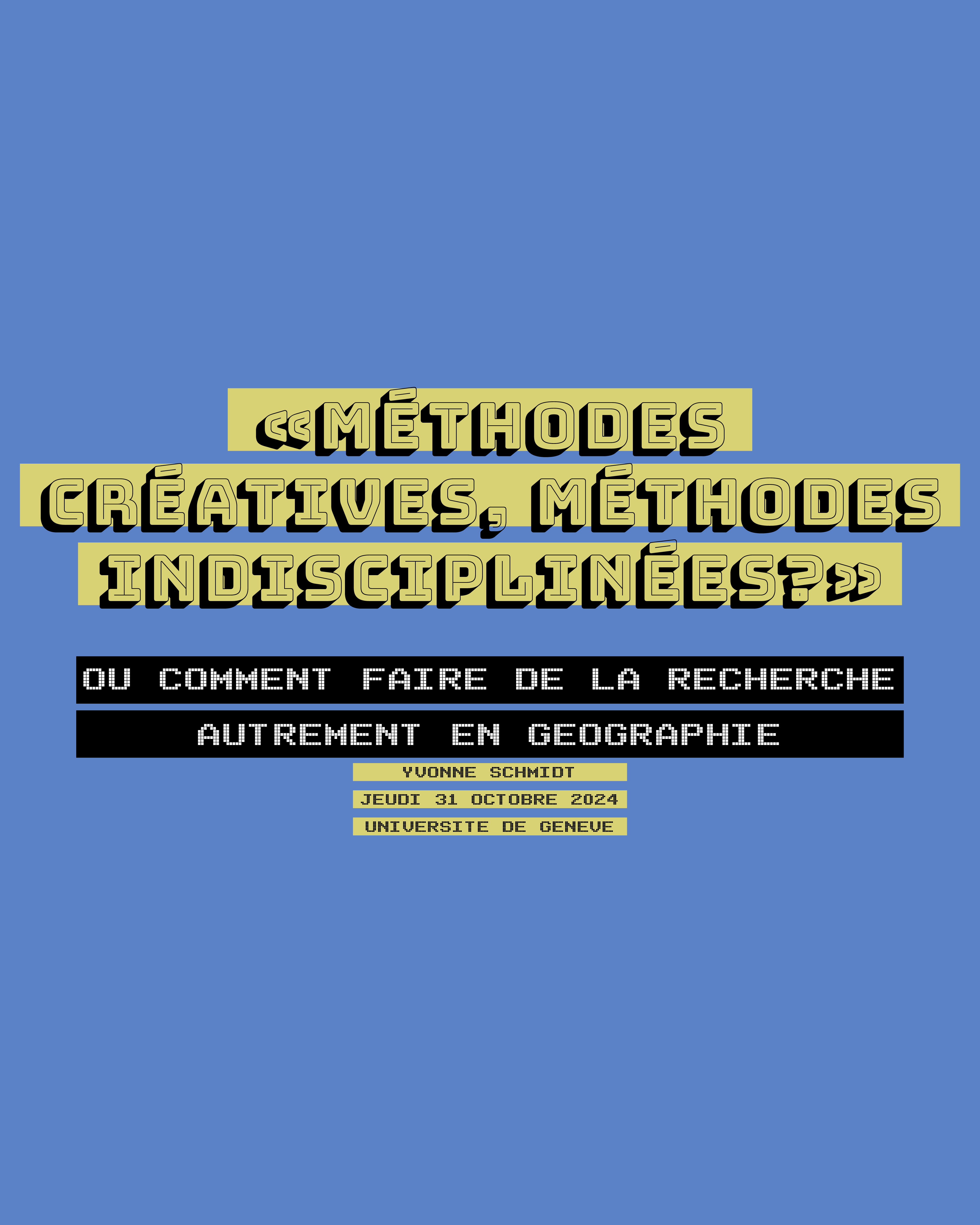
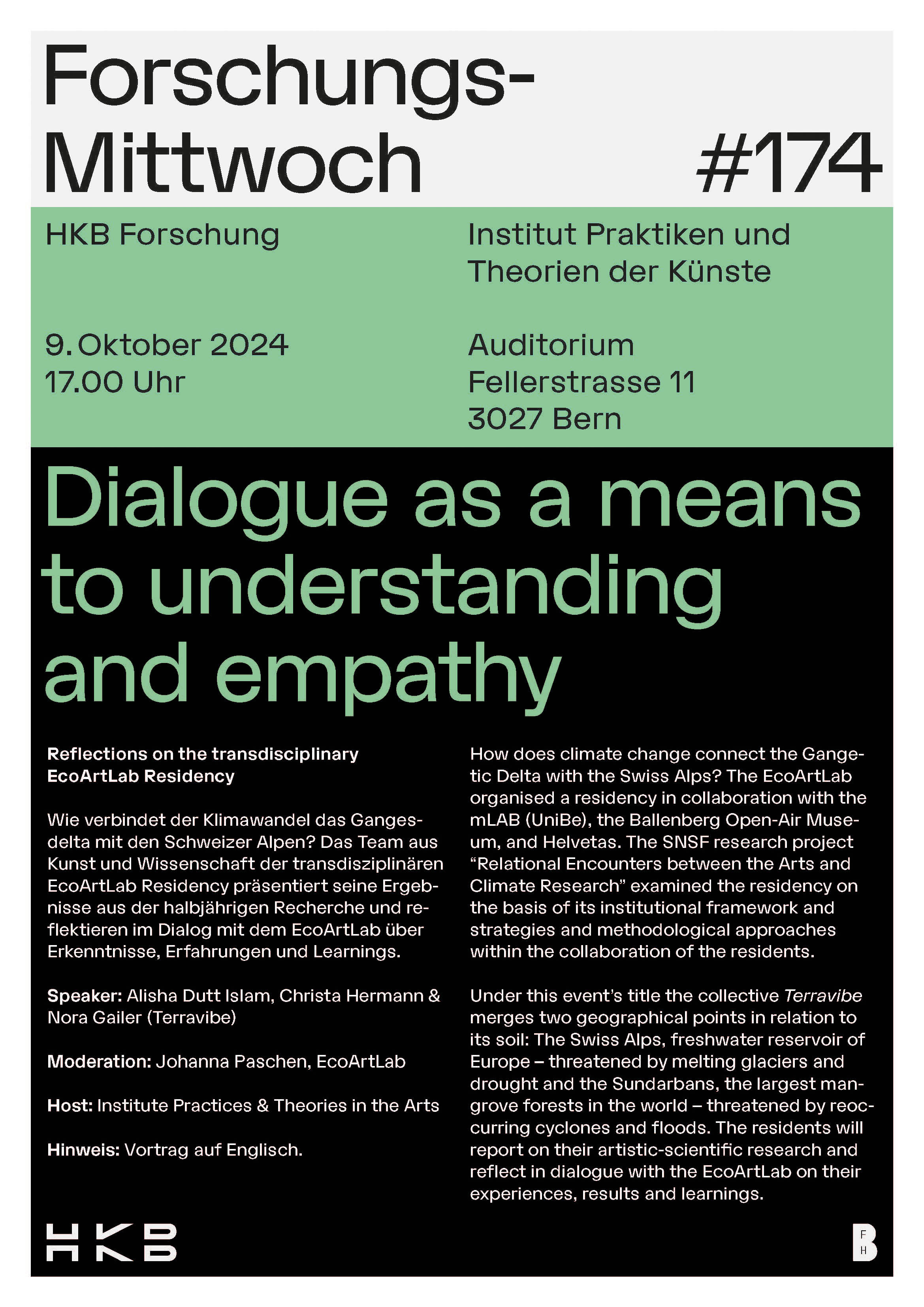
ForschungsMittwoch | EcoArtLab | Institut Praktiken und Theorien der Künste | HKB:
«Reflections on the transdisciplinary EcoArtLab Residency»
October 9, 17:00 – 19:00
Bern Academy of the Arts | Auditorium
Fellerstrasse 11, 3027 Bern
How does climate change connect the Gangetic Delta with the Swiss Alps? The EcoArtLab (HKB) organised a residency in collaboration with the mLAB (UniBe), the Ballenberg Open-Air Museum, and Helvetas under the themes of “Climate Change, Migration and In/Justice”. The SNSF research project “Relational Encounters between the Arts and Climate Research” examined the residency on the basis of its institutional framework and strategies and methodological approaches within the collaboration of the residents.
Under “Dialogue as a means to understanding and empathy” the collective Terravibe merges two geographical points in relation to their soil: The Swiss Alps, freshwater reservoir of Europe - threatened by melting glaciers and drought and the Sundarbans in the Ganges Delta, the largest mangrove forests in the world - threatened by reoccurring cyclones and floods.
The residents will report on their artistic-scientific research and reflect in dialogue with the EcoArtLab on their results, experiences, and learnings.
Speaker: Alisha Dutt Islam, Christa Hermann & Nora Gailer (Terravibe)
Moderation: Johanna Paschen, EcoArtLab, HKB
Host: Institute Practices & Theories in the Arts
about the Research Wednesday:
Research Wednesday offers insights into the research activities of the Bern Academy of the Arts. The series of events presents research work and puts it up for discussion. In some cases, ongoing or completed HKB projects are presented, in others national and international guests are invited, and in others students are invited to present their work and approaches as young researchers. In addition to the projects, questions relating to the significance of research for the departments and research in the arts will also be discussed.
the presentation will be recorded for research purposes
Research Wednesday:
«Reflections on the transdisciplinary EcoArtLab Residency»
October 9, 17:00 – 19:00
Bern Academy of the Arts | Auditorium
Fellerstrasse 11, 3027 Bern
How does climate change connect the Gangetic Delta with the Swiss Alps? The EcoArtLab (HKB) organised a residency in collaboration with the mLAB (UniBe), the Ballenberg Open-Air Museum, and Helvetas under the themes of “Climate Change, Migration and In/Justice”. The SNSF research project “Relational Encounters between the Arts and Climate Research” examined the residency on the basis of its institutional framework and strategies and methodological approaches within the collaboration of the residents.
Under “Dialogue as a means to understanding and empathy” the collective Terravibe merges two geographical points in relation to their soil: The Swiss Alps, freshwater reservoir of Europe - threatened by melting glaciers and drought and the Sundarbans in the Ganges Delta, the largest mangrove forests in the world - threatened by reoccurring cyclones and floods.
The residents will report on their artistic-scientific research and reflect in dialogue with the EcoArtLab on their results, experiences, and learnings.
Speaker: Alisha Dutt Islam, Christa Hermann & Nora Gailer (Terravibe)
Moderation: Johanna Paschen, EcoArtLab, HKB
Host: Institute Practices & Theories in the Arts
about the Research Wednesday:
Research Wednesday offers insights into the research activities of the Bern Academy of the Arts. The series of events presents research work and puts it up for discussion. In some cases, ongoing or completed HKB projects are presented, in others national and international guests are invited, and in others students are invited to present their work and approaches as young researchers. In addition to the projects, questions relating to the significance of research for the departments and research in the arts will also be discussed.
the presentation will be recorded for research purposes
Residency | EcoArtLab mLAB HELVETAS Ballenberg:
«Dialogue as a means to understanding and empathy»
Final presentation of the EcoArtLab residency at the Ballenberg Open-Air Museum:
How does climate change connect the Gangetic Delta with the Swiss Alps?
The interdisciplinary team of Terravibe from the fields of art and science will present the results of their six-month residency at the EcoArtLab.
On September 7, the residency guests Alisha Dutt Islam, Nora Gailer and Christa Hermann will introduce visitors at the Ballenberg Open-Air Museum to their installation at the Matten residence. For six months, they have been exploring how they can relate the Swiss Alps, threatened by glacial melting and drought, to the Gangetic Delta, which is repeatedly hit by tropical cyclones and floods. Using an artistic approach, they now show visitors how climate change manifests itself in the two regions. A short film adds local perspectives to the installation, while personal conversations with the residents provide insights into the background of the works and their research.
come join us on:
Saturday, Sept 7 | 13:00 – 14:15
start and end at Osteria Novazzano (Open-Air Museum Ballenberg)
After a short welcome we will practice together «dialogue and walking» while going to the Dwelling from Matten where we experience a shortfilm, before being introduced to their art installation and get more insights into their process.
For the full program at the Open-Air Museum Ballenberg organized by Helvetas during the European Heritage Days follow this Link
the presentation is not wheelchair accessible; parts of the 20 minute walk are steep; language: German and English
Immages: Terravibe
Final Presentation:
«Dialogue as a means to understanding and empathy»
Final presentation of the EcoArtLab residency at the Ballenberg Open-Air Museum:
How does climate change connect the Gangetic Delta with the Swiss Alps?
The interdisciplinary team of Terravibe from the fields of art and science will present the results of their six-month residency at the EcoArtLab.
On September 7, the residency guests Alisha Dutt Islam, Nora Gailer and Christa Hermann will introduce visitors at the Ballenberg Open-Air Museum to their installation at the Matten residence. For six months, they have been exploring how they can relate the Swiss Alps, threatened by glacial melting and drought, to the Gangetic Delta, which is repeatedly hit by tropical cyclones and floods. Using an artistic approach, they now show visitors how climate change manifests itself in the two regions. A short film adds local perspectives to the installation, while personal conversations with the residents provide insights into the background of the works and their research.
come join us on:
Saturday, Sept 7 | 13:00 – 14:15
start and end at Osteria Novazzano (Open-Air Museum Ballenberg)
After a short welcome we will practice together «dialogue and walking» while going to the Dwelling from Matten where we experience a shortfilm, before being introduced to their art installation and get more insights into their process.
For the full program at the Open-Air Museum Ballenberg organized by Helvetas during the European Heritage Days follow this Link
the presentation is not wheelchair accessible; parts of the 20 minute walk are steep; language: German and English
Immages: Terravibe

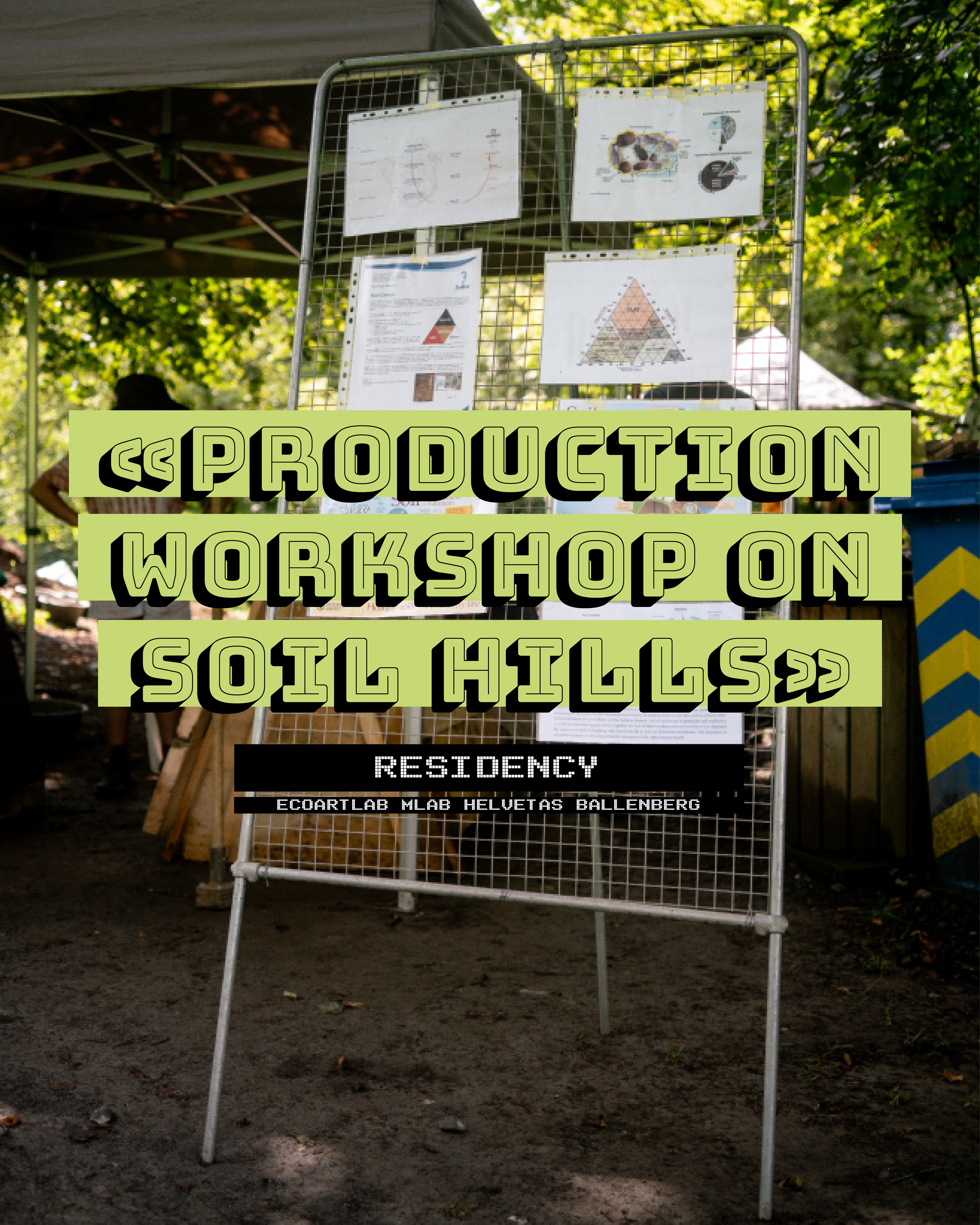
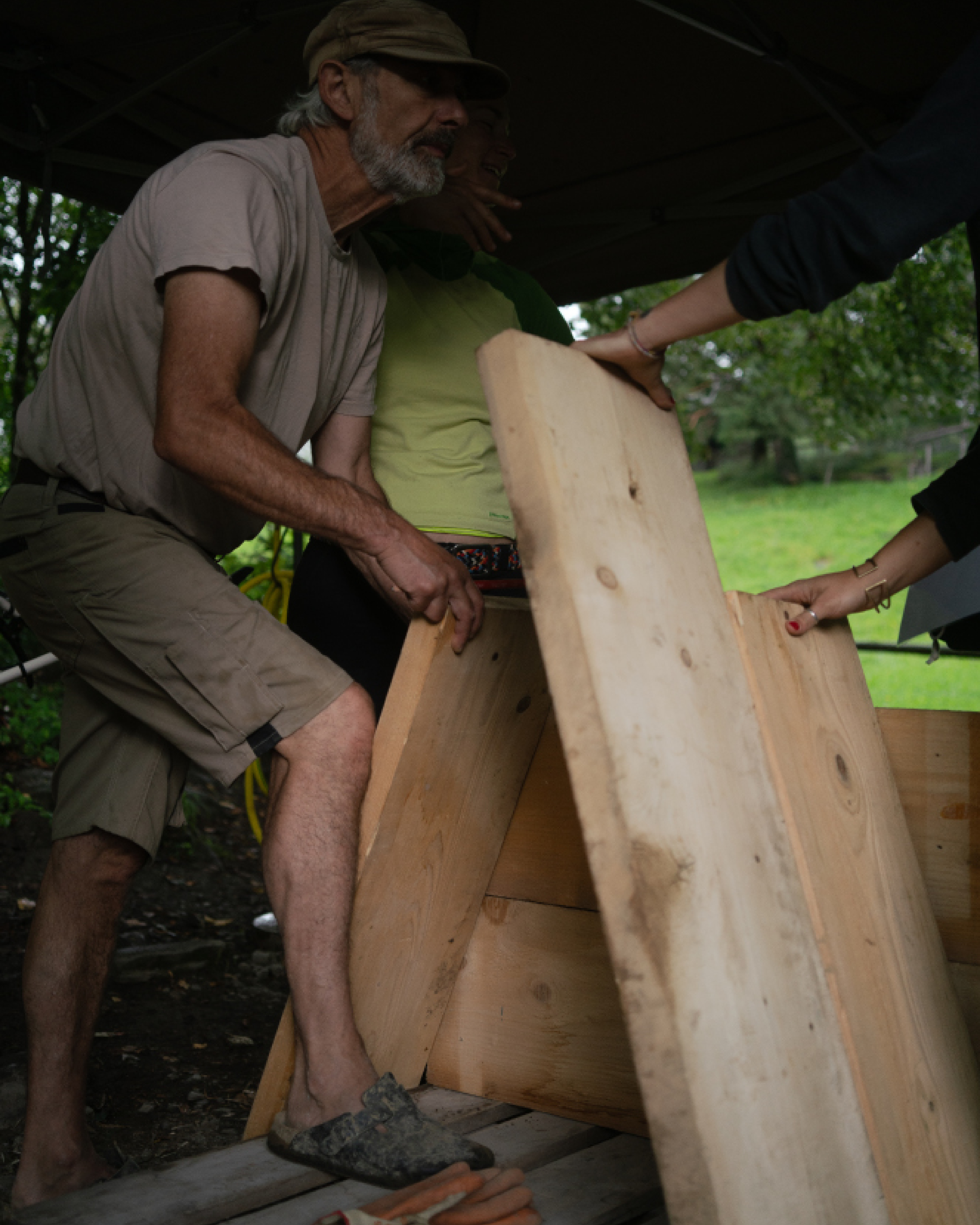
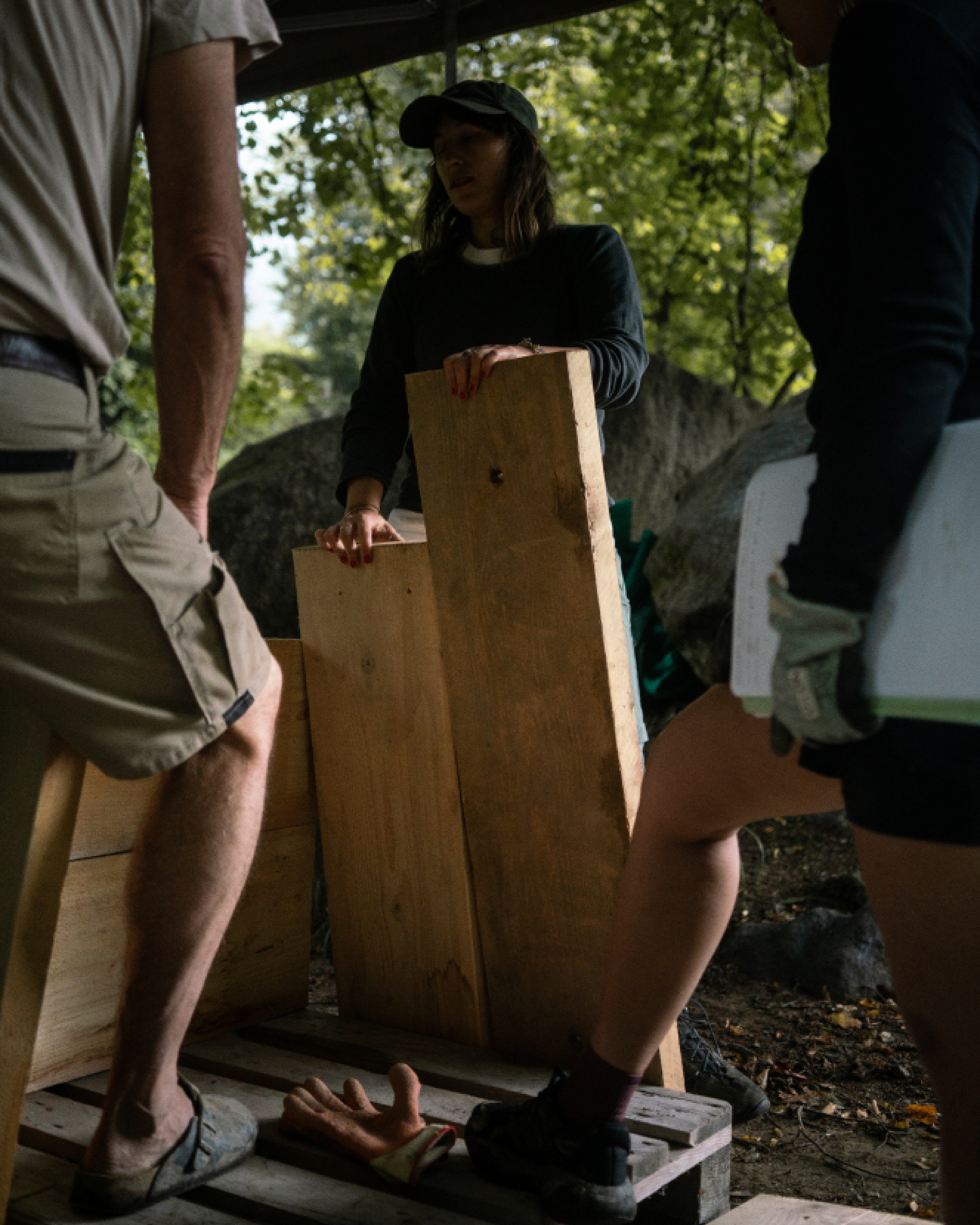





Residency | EcoArtLab mLAB HELVETAS Ballenberg:
At the beginning of this month, the residents of the current EcoArtLab residency focusing on climate change, migration and in/justice conducted a three-day production workshop at the Ballenberg Open-Air Museum. They used the traditional method of rammed earth to complete their artistic installation, which places the Gangetic Delta in context with the Swiss Alps. They invited visitors to actively participate, which led to exciting conversations and exchanges.
The finished installation and a complementary film as the results of their artistic-scientific research will be officially included in the exhibition of the Open-Air Museum Ballenberg from September 7.
Immages: Thubten Jonas Shontshang
«Production Workshop on Soil Hills»
At the beginning of this month, the residents of the current EcoArtLab residency focusing on climate change, migration and in/justice conducted a three-day production workshop at the Ballenberg Open-Air Museum. They used the traditional method of rammed earth to complete their artistic installation, which places the Gangetic Delta in context with the Swiss Alps. They invited visitors to actively participate, which led to exciting conversations and exchanges.
The finished installation and a complementary film as the results of their artistic-scientific research will be officially included in the exhibition of the Open-Air Museum Ballenberg from September 7.
Immages: Thubten Jonas Shontshang
